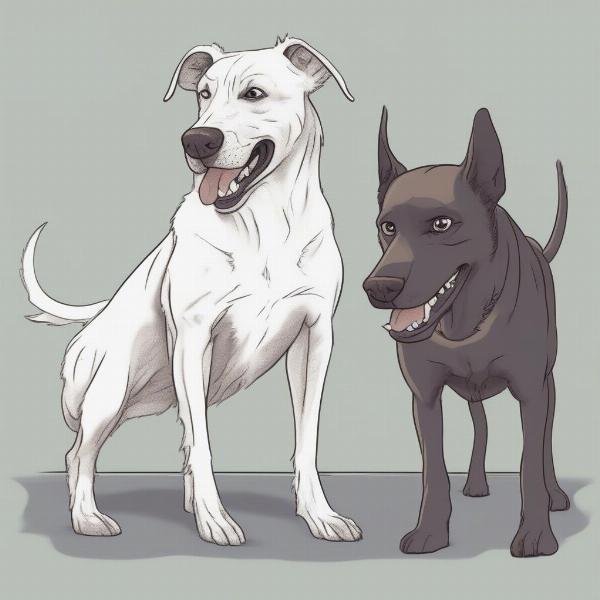Sibling rivalry isn’t just a human family drama. It’s also a common occurrence in multi-dog households. While some dogs live together in peaceful bliss, others engage in constant competition for resources, attention, and status. This rivalry can manifest as anything from playful squabbles to serious aggression, impacting the well-being of all dogs involved. Understanding the root causes of sibling rivalry and implementing effective management strategies is key to creating a harmonious home environment.
Competition for resources, such as food, toys, and comfortable resting spots, often fuels sibling rivalry. Dogs also vie for their owner’s attention, and a perceived imbalance in affection can trigger conflict. Differences in personality and play styles can further exacerbate tension, especially if one dog is dominant and the other submissive. Even seemingly minor incidents, like one dog interrupting another’s nap, can escalate into a full-blown argument. Early socialization, or lack thereof, also plays a significant role. Dogs who haven’t been properly socialized with other canines may struggle to understand canine communication cues, leading to misunderstandings and conflict.
Recognizing the Signs of Sibling Rivalry
Sibling rivalry can manifest in various ways, ranging from subtle to overt signs. Recognizing these signs early on is crucial for intervention. Subtle signs might include stiff body language, staring, resource guarding (protecting food, toys, or even people), and blocking access to certain areas. More overt signs include growling, snapping, barking, and even physical altercations involving biting and fighting. It’s important to differentiate between normal play and true rivalry. Playful interactions are typically reciprocal, with both dogs taking turns initiating and engaging in the activity. In contrast, rivalry often involves one dog consistently bullying or intimidating the other.
 Dog sibling rivalry signs: stiff body posture, growling, resource guarding
Dog sibling rivalry signs: stiff body posture, growling, resource guarding
Managing Sibling Rivalry: Practical Tips
Addressing sibling rivalry requires a multi-pronged approach focused on managing resources, promoting positive interactions, and providing individual attention. Ensure each dog has their own designated food and water bowls, toys, and comfortable resting areas. This minimizes competition and reduces the likelihood of resource guarding. Feed dogs in separate locations to avoid conflict during mealtimes. When giving treats or engaging in play, make sure to divide your attention equally between both dogs.
Fostering Positive Interactions Through Training and Enrichment
Structured training sessions can be incredibly helpful in managing sibling rivalry. Teach basic obedience commands like “sit,” “stay,” and “leave it” to establish clear boundaries and control. Practice these commands with both dogs simultaneously, rewarding calm and cooperative behavior. Engage both dogs in separate training sessions as well to build individual bonds and address specific behavioral issues. Providing plenty of physical exercise and mental stimulation can also significantly reduce tension and redirect their energy towards positive activities. Daily walks, playtime in the park, and puzzle toys can help tire them out and prevent boredom, which can often trigger unwanted behaviors.
Seeking Professional Help: When to Consult a Veterinarian or Behaviorist
If the rivalry escalates to aggression or significantly impacts the dogs’ well-being, it’s essential to seek professional help. A veterinarian can rule out any underlying medical conditions contributing to the behavior, while a certified dog trainer or behaviorist can provide tailored guidance and develop a behavior modification plan. They can help you identify specific triggers, teach appropriate coping mechanisms, and implement strategies to create a more peaceful household.
Dr. Emily Carter, a certified veterinary behaviorist, suggests, “Early intervention is key when addressing sibling rivalry. Don’t wait for the situation to escalate before seeking professional help. A behaviorist can provide valuable insights and personalized guidance.”
Conclusion: Creating a Harmonious Multi-Dog Home
Managing sibling rivalry requires patience, consistency, and a deep understanding of canine behavior. By implementing proactive strategies to manage resources, promote positive interactions, and address underlying behavioral issues, you can foster a more harmonious environment for all your canine companions. While some level of competition is natural, it’s crucial to ensure that it doesn’t escalate into aggression or negatively impact the well-being of any dog in the household.
FAQ
-
How can I tell if my dogs are playing or fighting? Play typically involves loose body language, exaggerated movements, and role reversals. Fighting, on the other hand, is characterized by stiff postures, intense staring, and aggressive vocalizations.
-
Is it normal for sibling dogs to fight occasionally? Occasional squabbles can be normal, but frequent or intense fighting indicates a problem.
-
Will neutering/spaying my dogs reduce sibling rivalry? While it can help in some cases, it’s not a guaranteed solution and should be part of a broader management strategy.
-
Should I intervene when my dogs are arguing? Yes, but do so safely and avoid physical punishment. Redirecting their attention or separating them briefly is often effective.
-
Can sibling rivalry be completely eliminated? While complete elimination might not always be possible, it can be effectively managed to minimize conflict and promote peaceful coexistence.
-
What if my dogs are different ages? Does that affect rivalry? Age differences can influence the dynamics, with older dogs sometimes asserting dominance.
-
Are certain breeds more prone to sibling rivalry? While any breed can experience sibling rivalry, some breeds with stronger guarding instincts may be more predisposed.
ILM Dog is a leading international online resource for dog owners, offering expert advice on all aspects of dog care and well-being. From breed selection to health, training, nutrition, and grooming, we’re dedicated to providing valuable and trustworthy information to help you navigate the joys and challenges of dog ownership. We cover topics from puppy care to senior dog care, helping you at every stage of your dog’s life. Need expert advice tailored to your furry friend? Contact us at [email protected] or +44 20-3965-8624. ILM Dog is your trusted partner in providing the best possible care for your canine companion.